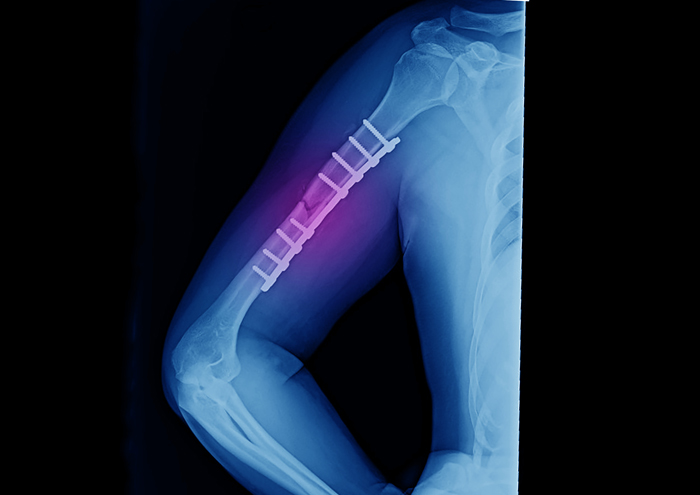Open Reduction Internal Fixation Treatment & Diagnostics in Chunni Ganj, Kanpur
Open Reduction Internal Fixation
Open reduction internal fixation or ORIF is a type of surgery performed at Apollo Spectra, Kanpur, to repair critically broken bones by putting the pieces back into their original position. Serious injuries that involve fractures that displace bones, break them into many pieces, lead to bones sticking out through the skin or involve the joint are usually fixed through ORIF.
Unlike surgeries that used a cast or splint to fix a fracture using external support, ORIF uses sutures, screws, metal pins, rods, plates to internally hold the bones together until they heal. These implants are made out of strong and durable materials like stainless steel and are appropriate for internal fixation.
It has been observed that repairing major fractures through the technique of open reduction internal fixation is being recommended more often due to its increased rates of successful surgeries and results.

What happens during ORIF?
ORIF is performed by an orthopedic surgeon as an urgent surgery depending upon the fracture’s severity. Fractures of bones in the arms, legs, shoulders, wrists, elbows, ankles, knees, or hips, can be fixed through this surgery.
As the name suggests, ORIF procedure at Apollo Spectra, Kanpur, involves making an incision to operate internally on the broken pieces of bones and put them back into their place. But before beginning the operation, general anesthesia is administered to reduce the discomfort or pain that a patient can experience during the surgery.
After the anesthesia is injected, an incision is made in the skin above the bone breakage. Through this incision, the broken pieces of the bone are realigned and put back into their original place. These broken pieces are held together through metal screws, wires, rods, etc. that go through the bones.
The incision is then closed using sutures and stitches and covered with surgical bandages. Depending upon the placement and type of fracture, the surgeon may use a cast or limb to provide external support during the healing of the bones.
An X-ray will be taken to observe the bone post-operation and make sure that the bone has been placed correctly. Your blood pressure, breathing, and pulse may also be observed by the doctor while you rest after the surgery.
Benefits of ORIF
The advances that are being made in the techniques used for surgeries like ORIF help provides certain benefits over other methods. One such benefit is the reduced risk of infection that can be caused during internal fixation.
Internal stabilization of bones through ORIF can also help reduce the time that is required for recovery after the operation. The period of hospital stay is also shorter for patients that undergo ORIF.
Incidences of improper or unsuccessful healing of the bones are also at a low rate for patients who undergo ORIF in comparison to the external treatment of a fracture.
Risks and Complications
Like any other surgery, some possible risks and complications can occur post-surgery. These include:
- Infection
- Bleeding or blood clotting
- Risk of reaction to anesthesia
- Nerve injury
- Blood vessel damage
- Injury to tendons or ligaments
- Improper or incomplete bone healing
- Dealignment of metal hardware
- Persistent pain due to hardware
- Persistently increased pressure inside the arms or legs
- Arthritis
- Tendonitis
Immediately contact your doctor or surgeon in case you experience any such complications after the surgery. You might require another surgery in case the hardware gets infected or there is improper or incomplete healing.
Request an appointment at Apollo Spectra Hospitals, Kanpur
Call 1860-500-2244 to book an appointment
Who is the right candidate for ORIF?
Certain factors may increase complications for you if you undergo the surgery. Factors that suggest that ORIF is not recommended for you include:
- Obesity
- Consumption of tobacco and alcohol
- Diabetes
- Blood clotting history
- Liver diseases
- Consumption of certain medications
You may be asked to stay at the hospital overnight. Recovery after undergoing an ORIF surgery can last from 3 to 12 months depending upon the location and severity of the fracture. Mild fractures can heal within 3 to 6 weeks.
Your doctor will prescribe pain medication to help manage the pain inflicted during the recovery period.
Maintain cleanliness around the incision to lower the risk of infection in the fracture. Avoid touching the fracture, especially if your hands are not clean. Do not allow others to touch your fracture as well. Do not perform strenuous activities unless allowed by your doctor.
Symptoms
Our Top Specialities
NOTICE BOARD
CONTACT US
CONTACT US
 Book Appointment
Book Appointment


.svg)
.svg)
.svg)
.svg)








